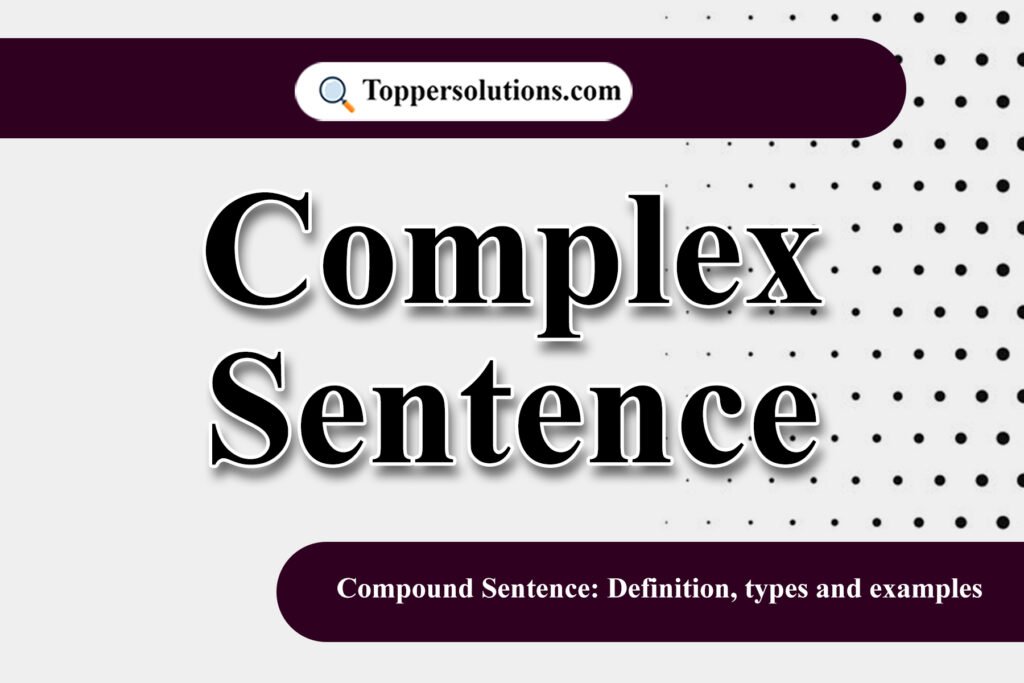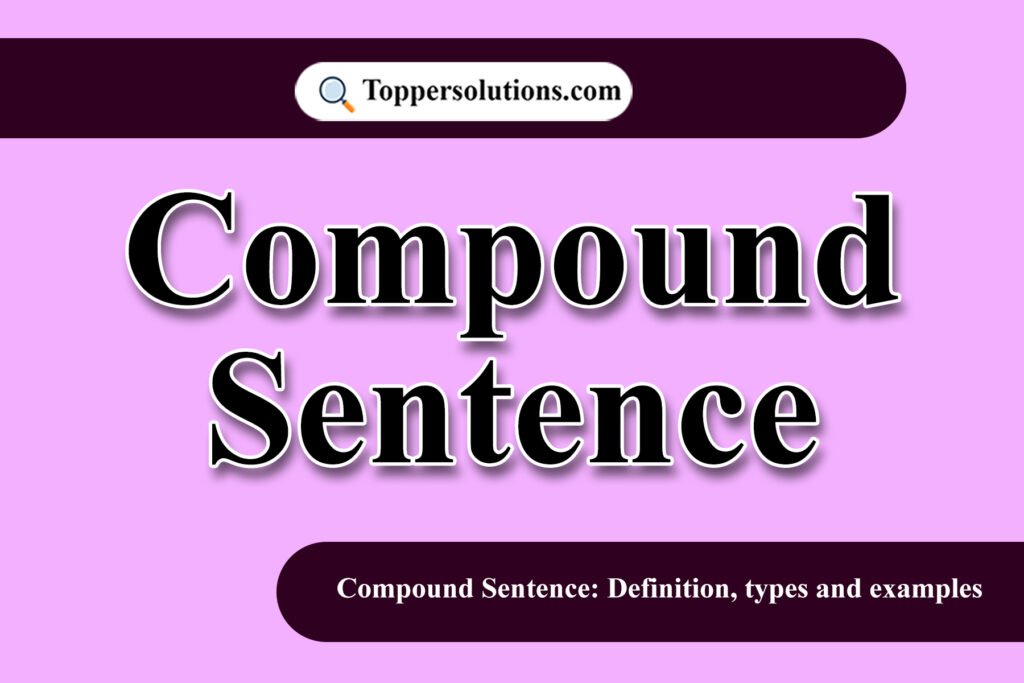Narration/Direct and Indirect Speech
What is Narration/Direct and Indirect Speech
Narration is the art of reporting a speaker’s words. There are two main ways to report a speech. One is direct speech; the other is indirect Speech.
- Direct Speech/ Narration
- Indirect Speech/ Narration
Direct Narration/Speech:
Direct speech is a sentence in which the exact words spoken are expressed in speech marks (also known as quotation marks or inverted commas).
For example:
- Ram said to me, “I am preparing for upcoming events.”
- “You’ll never guess what I’ve just seen!” said Ram, excitedly. “What’s that?” asked Kavya.
Indirect Narration/Speech:
Indirect speech, also known as reported speech, is when words or phrases are reported in our own words. The original words are modified and/or interpreted as opposed to being quoted. When talking about indirect speech, we use words that refer to something that has already happened.
For example:
- She told me that she was living in an old house.
- Rajeev asked me if I wanted to help the poor.
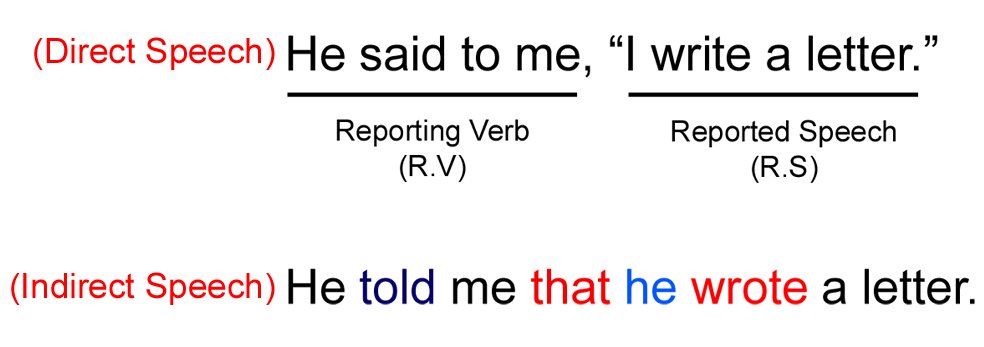
Reporting Clause/Verb: A reporting clause is a clause that indicates that you are talking about what someone said or thought.
For example:
‘She said that she was hungry’, ‘She said‘ is a reporting clause.
→ The reporting clause includes a verb such as say, tell, ask, reply, or shout, usually in the past simple, and the reported clause includes what the original speaker said. William said, “I need your help.”
Reported Clause/Speech: A reported clause is a subordinate clause that indicates what someone said or thought.
For example:
She said, “She is hungry.” In this sentence “She is hungry” is a Reported clause.
Rules of changing direct speech into indirect speech (Assertive Sentences)
- Rule.1: The reporting verb is changed as follows:
| says to | tells |
| say to | tell |
| said to | told |
- Rule.2: Remove commas and inverted commas.
- Rule.3: Connective “that” is used
- Rule.4: Change the 1st letter of the reported speech into a small letter except for “I”
- Rule.5: Tense, Pronoun, and time and distance-related words are changed as per the rule.
Note: There is no change in the tense form of the verb in Reporting Verb.
CHANGES OF PRONOUN: (CHART – 1)
Pronoun Change Rules:
| S | O | N |
| 1 | 2 | 3 |
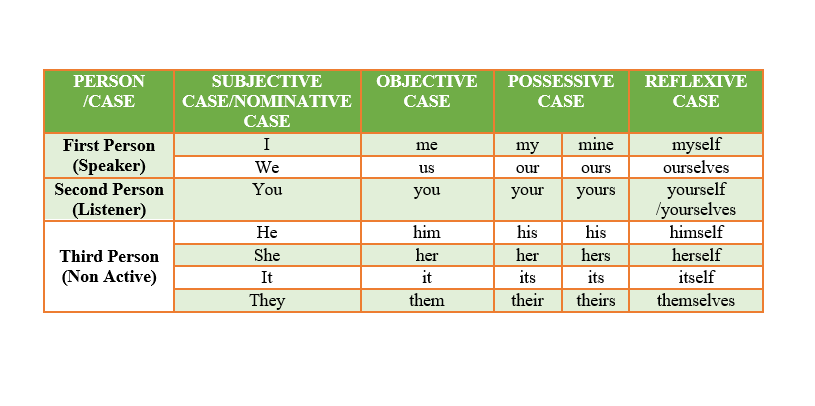
CHANGES OF TENSE: (CHART – 2)
Trick:
- Present Tense is changed into Past Tense.
- Simple Past Tense is Changed into Past Perfect Tense.
- Past Continuous Tense is changed into Past Perfect Continuous Tense.
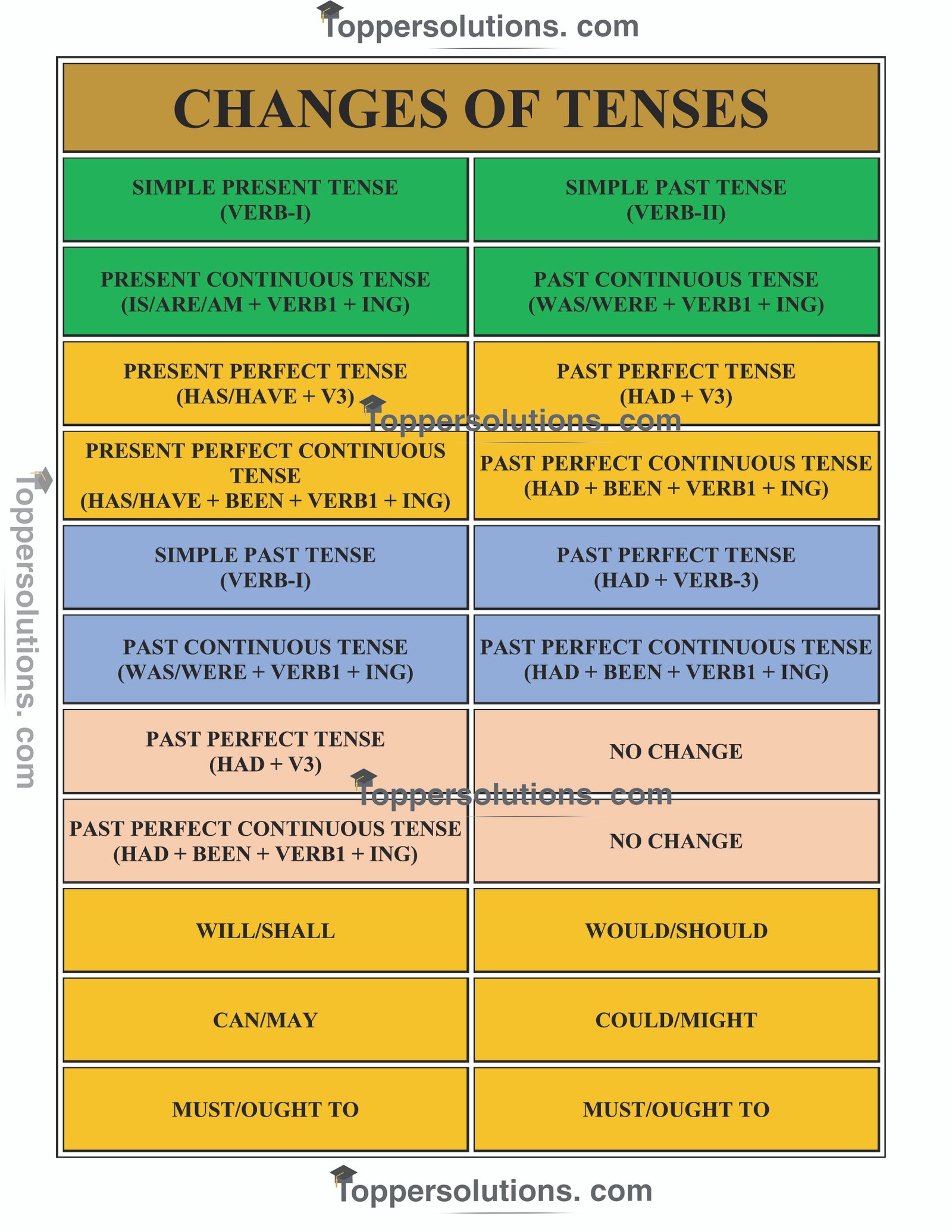
TIME AND PLACE/DISTANCE RELATED CHANGE: (CHART – 3)
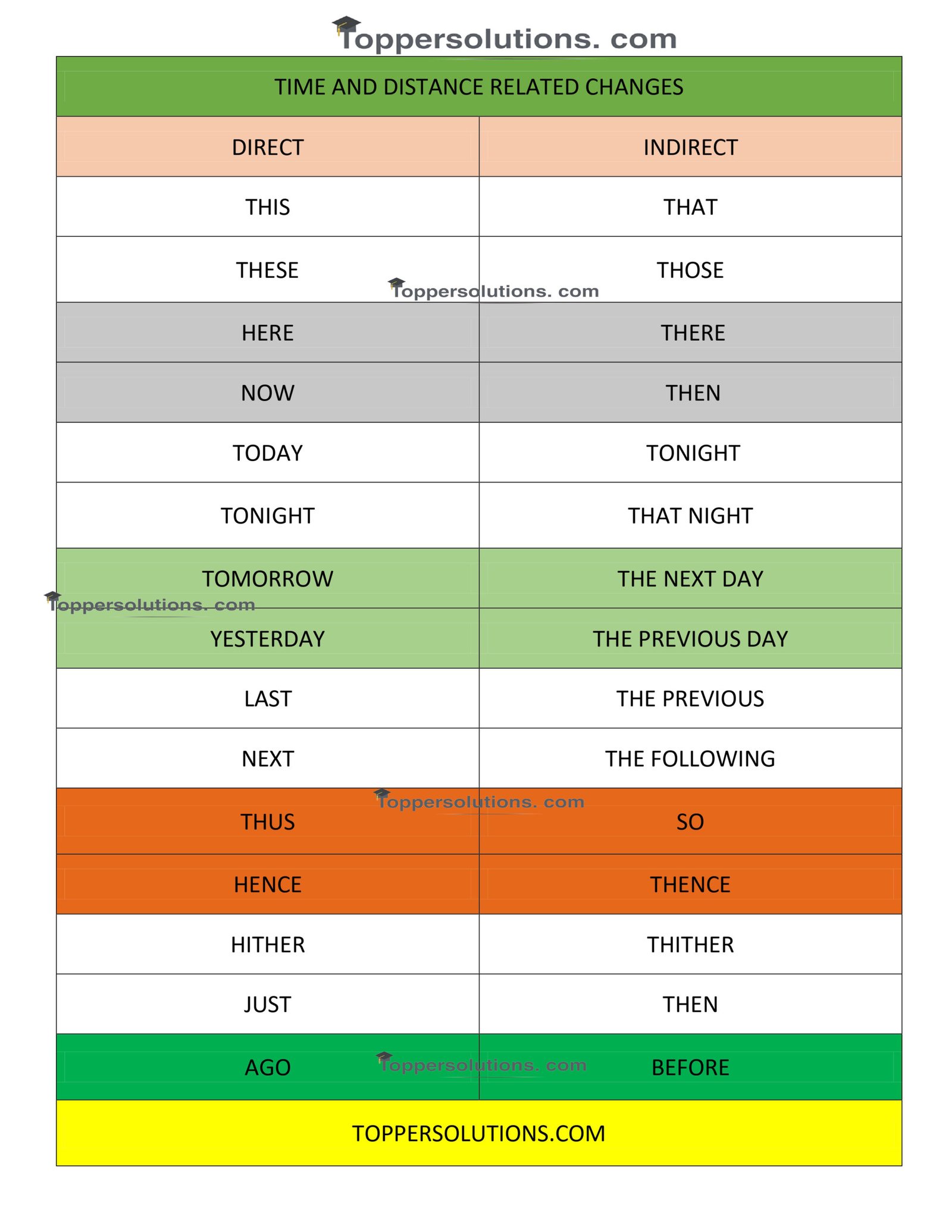
While converting Direct from Indirect, the following three rules related to Pronoun are used.
(i) If any 1st person pronoun [I, me, my, mine, myself, we, us, our, ours, ourselves] has been used in the reported speech, then they should be used according to the person, number, gender and case of the subject of the reporting verb. Change accordingly.
Eg.
- Direct: Student said to the teacher, “I want to learn this topic”.
- Indirect: Student told the teacher that he wanted to learn that topic.
(ii) If the verb 2nd person pronoun [you, your, yours, yourself, & yourselves] is used in the Reported speech, then it is changed according to the person, number, gender and case of the object used after the reporting verb.
Eg.-
- Direct: I said to Mansi, “You do not complete your work at time.”
- Indirect: I told Mansi that she did not complete her work at time.
Note-If the reporting verb is followed by Obj. and 2nd person pronoun is not used in the reported speech, then in such a situation, assume a proper object to change it and make changes accordingly.
Example.
- Direct: I said, “You do your work yourself.”
- Indirect: I said that she did her work herself.
(iii) If a 3rd person [he, him, his, himself, she, her, her, hers, herself, it, its, itself, they, them, their, theirs, themselves] is used in the Reported Speech, then no changes are made in them while making the indirect speech.
Example.
- Direct: I said to you, “He and she are living with their parents”.
- Indirect: I told you that he and she were living with their parents.
1. If the reporting verb is present or future tense, then while making indirect, do not make any changes in the tense of the verb of the reported speech.
- Direct: Father says to me, “You do not go to school regularly”.
- Indirect: Father tells me that I do not go to school regularly.
- Direct: You will say to him, “I can’t help you now.”
- Indirect: You will tell him that you can’t help him then.
2. If the reporting verb is in past tense then while making indirect the reported speech follows the following 10 rules in the tense of the verb.
(i) Change The Present Indefinite Tense to Past Indefinite Tense.
- Direct: Father said to me, “I grow plants every year.”
- Indirect: Father told me that he grew plants every year.
(ii) Change the Present Continuous Tense into Past Continuous Tense.
- Direct: Mother said to me, “I am cooking food at this time.”
- Indirect: Mother told me that she was cooking food at that time.
(iii) Present perfect Tense is changed into Past Perfect Tense.
- Direct: Principal said to us, “This session has completed.”
- Indirect: Principal told us that that session had completed.
(iv) Present perfect continuous Tense is changed into Past Perfect Continuous Tense.
- Direct: Mother said to me, “It has been raining since morning.”
- Indirect: Mother told me that it had been raining since morning.
(v) Past Indefinite Tense is changed into Past Perfect Tense.
- Direct: Madan said to Simran, “You did not sing well.”
- Indirect: Madan told Simran that she had not sung well.
(vi) Past continuous tense is changed into Past Perfect Continuous Tense.
- Direct: Munal said to me, “I was studying since beginning.”
- Indirect: Munal told me that he had been studying since beginning.
(vii) Past Perfect and Past prefect continuous Tense are not changed.
- Direct: Pooja said, “I had sung the song.”
- Indirect: Pooja said that she had sung the song
- Direct: Seema said to me, “I had been working hard since my sixth class,”
- Indirect: Seema told me that she had been working hard since her sixth class.
(viii) Modals Verbs are changed as following
| Shall | Should |
| Will | Would |
| Can | Could |
| May | Might |
- Direct: Prem said to me, “I can start my new work now.”
- Indirect: Prem told me that he could start his new work then.
(ix) “Should, would, could, might, must, used to ought to, need and dare” need no change.
- Direct: Teacher said to the students, “You should work hard for your success.”
- Indirect: Teacher told the students that they should work hard for their success.
(x) Exception -We won’t change in the tense form of Reported speech in following conditions even Reporting Verb is in Past Tense.
1 Universal Truth/Mathematical Facts/ Scientific Facts/ Idioms and Proverbs/Historical facts etc.
- “The sun rises in the east.”
- “The earth moves round the sun.”
- “Two and two make four.”
- “Honesty is the best policy.”
- “The earth is round.”
- “The sun sets in the west.”
Example:
- Direct: Mother said to me, “God is one.”
- Indirect: Mother told me that God is one.
Types of Sentences:
- Assertive sentence
- Interrogative sentence
- Imperative sentence
- Exclamatory sentence
- Optative sentence
1. Assertive Sentence.
- Rule.1: The reporting verb is changed as follows:
| says to | tells |
| say to | tell |
| said to | told |
- Rule.2: Remove commas and inverted commas.
- Rule.3: Connective “that” is used
- Rule.4: Change the 1st letter of the reported speech into a small letter except for “I”
- Rule.5: Tense, Pronoun, and time and distance-related words are changed as per the rule.
Note: There is no change in the tense form of the verb in Reporting Verb.
- Direct: Ram said to his mother, “I am going to market with my friend.”
- Indirect: Ram told his mother that he was going to market with his friend.
Exercise
Change the following sentences into Indirect speech.
- Mother said to me, “I want a glass of cold water.” 2. She said to me, “You are very sad today.”
- Sunita said to me, “I will meet you tomorrow.”
- Suresh said to her, “Rajesh is my best friend.
- They said to their owner, “We have nothing to do now.
- Sudama said to his wife, “I am going to visit my best friend lord Krishna.”
- Lata said to us, “I have been singing here for two days”
- The father said to me, “People did not help the poor.”
- The brother said to her, “Your friend can cheat you. 10. Students said to the teacher, “They have done their work.”
Answers
- Mother told me that she wanted a glass of cold water.
- She told me that I was very sad that day.
- Sunita told me that she would meet me the next day.
- Suresh told her that Rajesh was his best friend.
- They said to their owner that they had nothing to do then.
- Sudama told his wife that he was going to visit his friend lord Krishna.
- Lata told us that she had been singing there for two days.
- The father told me that people had not helped the poor.
- The brother told her that her friend could cheat her.
- Students told the teacher that they had done their work.
2. (a) Interrogative Sentence (Close Ended)
- Rule.1: The reporting verb is changed as follows:
| says/ says to | asks |
| say/ say to | ask |
| said / said to | asked |
- Rule.2: Remove commas and inverted commas.
- Rule.3: Connective “If/Whether” is used
- Rule.4: Change the 1st letter of the reported speech into a small letter except for “I”
- Rule.5: Tense, Pronoun, and time and distance-related words are changed as per the rule.
- Rule.6: Interrogative Sentence is changed into assertive one.
Examples:
- She said to me, “Do you like this book or not?”
- Captain said to us, “Are you going to join the camp?
- Mother said, “Have you completed your work or not?
- Teacher said to the students, “Did you study this lesson yesterday?”
- My friend said to her, “Can she help in this matter?”
Answers:
- She asked me if I liked that book or not.
- Captain asked us if we were going to join that camp.
- Mother asked if he/she had completed his/her work or not.
- Teacher asked the students if they had studied that lesson the previous day.
- My friend asked her if she could help in that matter.
2. (b) Interrogative Sentence (Open Ended)
- Rule.1: The reporting verb is changed as follows:
| says/ says to | asks |
| say/ say to | ask |
| said / said to | asked |
- Rule.2: Remove commas and inverted commas.
- Rule.3: No Connective is used (Wh word is used as a connective)
- Rule.4: Change the 1st letter of the reported speech into a small letter except for “I”
- Rule.5: Tense, Pronoun, and time and distance-related words are changed as per the rule.
- Rule.6: Interrogative Sentence is changed into assertive one.
Examples;
- I said to him, “Why did you laugh at me yesterday?
- He said to her, “How many brothers do you have?”
- Sohan said to me, “When did I report about this?”
- She said to him, “Whom did you give my book?”
- Monitor said, “Whose book is this?”
Answers:
- I asked him why he had laughed at me the previous day.
- He asked her how many brothers she had.
- Sohan asked me when he had reported about that.
- She asked him whom he had given her book.
- Monitor asked whose book this was.
3. (a) Imperative Sentences:
- Rule.1: The reporting verb is changed according to the sense. (Requested/Ordered/suggested/advised/prohibited etc..)
- Rule.2: Remove commas and inverted commas.
- Rule.3: Connective “to” is used.
- Rule.4: Change the 1st letter of the reported speech into a small letter.
- Rule.5: Tense, Pronoun, and time and distance-related words are changed as per the rule.
- Rule.6: Imperative Sentence is changed into assertive one.
- Rule.7: Remove please/kindly/sir/ma’am/madam
Examples:
Change the following sentences into Indirect speech.
- She said to me, “Consult the doctor for right treatment.
- The mother said to her baby, “Don’t play in the dust.”
- Baby said to her mother, “Please give me a glass of milk.”
- An illiterate man said to me, “Write a letter for me please.”
- The examiner, “Stop your pen. Time is over.”
- The mother said to him, “Don’t jump into the river.”
- The teacher said, “Open, your book on page fifty.”
- The instructor said to us, “Take milk daily.”
- The teacher said to the students, “Meet me in the hall.”
- The guide said to the visitors “Please do not touch these statues.
Answers:
- She advised me to consult the doctor for right treatment.
- The mother advised her baby not to play in the dust.
- Baby requested her mother to give her a glass of milk.
- An illiterate man requested me to write a letter for him.
- The examiner ordered to stop their pen and told that time was over.
- The mother suggested him not to jump into the river.
- The teacher ordered to open their work on page fifty.
- The instructor suggested us to take milk daily.
- 9.The teacher ordered the students to meet him in the hall.
- The guide requested the visitors not to touch those statues.
3. (b)Sentences starting with “Let’s”
- Rule.1: The reporting verb is changed into suggested.
- Rule.2: Remove commas and inverted commas.
- Rule.3: Connective “that” is used.
- Rule.4: Change the 1st letter of the reported speech into a small letter.
- Rule.5: Tense, Pronoun, and time and distance-related words are changed as per the rule.
- Rule.6: Imperative Sentence is changed into assertive one.
- Rule.7: Let is changed into Should/would.
- Rule.8: Us is changed into we/they.
Examples:
- Mohan said to me, “Let’s go for morning walk”
- The teacher said, “Let him go home.”
- The captain said, “Let’s play well.”
- The officer said to his soldiers, “Keep firing.”
- The doctor said to the patient, “Take exercise daily.”
Answers:
- Mohan proposed me that we should go for morning walk.
- The teacher bade to let him go home.
- The captain proposed that they should play well.
- The officer ordered his soldiers to keep firing.
- The doctor advised the patient to take exercise daily.
4. Optative Sentence
- Rule.1: The reporting verb is changed according to the sense.
- Wished
- blessed
- cursed
- Rule.2: Remove commas and inverted commas.
- Rule.3: Connective “that” is used but Good morning, Good night, Good day, Thank you, Best of luck are given in the sentence then we do not use any conjunctions.
- Rule.4: Change the 1st letter of the reported speech into a small letter.
- Rule.5: Tense, Pronoun, and time and distance-related words are changed as per the rule.
- Rule.6: Optative sentence is changed into Assertive one.
- Rule.7: May is changed into might
Change the following sentences into Indirect speech.
- My mother said to me, “May God bless you!”
- My father said to us, “May you get success in life!”
- The teacher said to the students, “May you get good marks in your exam!”
- My brother said to me, “Best of luck!”
- An angry saint said to the stranger, “May you go to hell!”
- Lencho said, “May God help us in our trouble!”
- Rajat said to his enemy, “May you die today!”
- Students said, “Good Morning, sir!”
- Well wisher said, “May God help the needy!”
- My sister said to me, “May you live long!”
Answers
- Mother wished that God might bless me.
- Father blessed us that we might get success in life.
- The teacher blessed the students that they might get good marks in their exam.
- My brother wished me best of luck.
- An angry saint cursed the stranger that he might go to hell.
- Lencho prayed that God might help them in their trouble.
- Rajat cursed his enemy that he might die that day.
- Students wished good morning to their sir.
- Well wisher wished that God might help the needy.
- My sister wished that I might live long.
5. Exclamatory Sentence
- Rule.1: The reporting verb is changed according to the sense.
- exclaimed with joy
- exclaimed with sorrow
- exclaimed with surprise
- Rule.2: Remove commas and inverted commas.
- Rule.3: Connective “that” is used.
- Rule.4: Change the 1st letter of the reported speech into a small letter.
- Rule.5: Tense, Pronoun, and time and distance-related words are changed as per the rule.
- Rule.6: Exclamatory Sentence is changed into assertive one.
- Rule.7: Remove exclamation words (Alas!, Ah!, Oh!, bravo!, Uf! What! How!, O!, O time! O God! Hurrah! )
Examples
Change the following sentences into Indirect speech.
- He said, “Hurrah! we have won the match.”
- She said. “Alas! I have undone.”
- She sobbed, “Alas! My grandmother has died”
- My father said to me, “Bravo you did the best.”
- The principal said to us, “O God! a weak student has passed.”.
Answers
- He exclaimed with joy that they had won the match.
- She exclaimed with sorrow that she had undone.
- She exclaimed with sadness that her grandmother had died.
- My father admired me that I had done the best.
- The principal exclaimed with wonder that a weak student had passed.
Note : If How/what is given in the sentence then we remove what/how and use great/very.
Change the following sentences into Indirect speech.
- My sister said, “How beautiful the rain is.”
- Prem said, “What a great man you are!”
- He said, “What a sweat voice she has!.”
- She said, “How lucky I am!”
- Pawan said to me, “What a fool I am!”
Answers
- My sister exclaimed with joy that the rain was very beautiful.
- Prem exclaimed with joy that he was a great man.
- He exclaimed with surprise that she had a sweat voice.
- She exclaimed with joy that she was very lucky.
- Pawan exclaimed that he was a great fool.
What is a complex sentence? Definition: A complex sentence is a sentence that contains an independent clause and one or more dependent clauses. An independent clause, also known as a …
Synthesis किसे कहते हैं? परिभाषा: दो या दो से अधिक Simple Sentences को मिलाकर एक नया वाक्य बनाया जाता है। यह नया वाक्य Simple, Complex और Compound में से किसी …
What is a compound sentence? Definition: A compound sentence consists two or more independent clauses connected by a coordinating conjunction or punctuation and both. Independent clauses are clauses that can …

